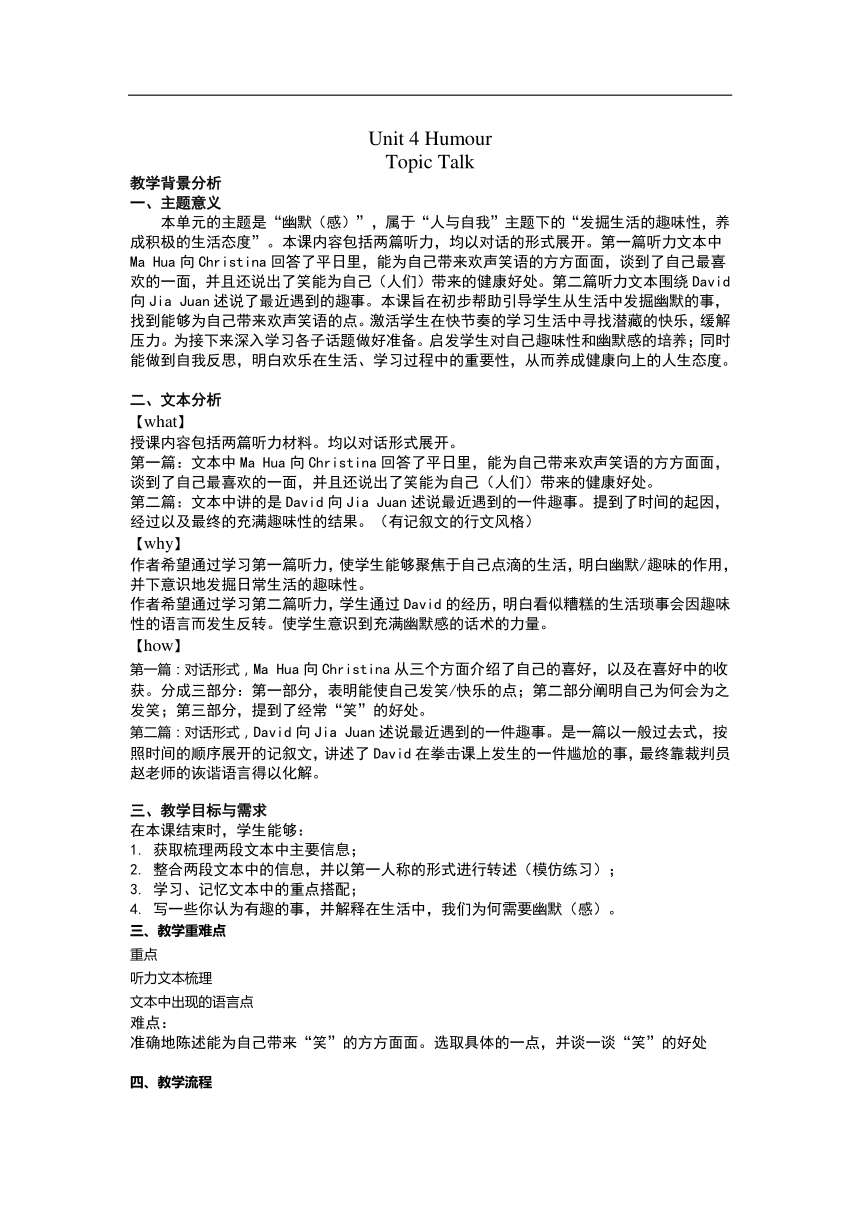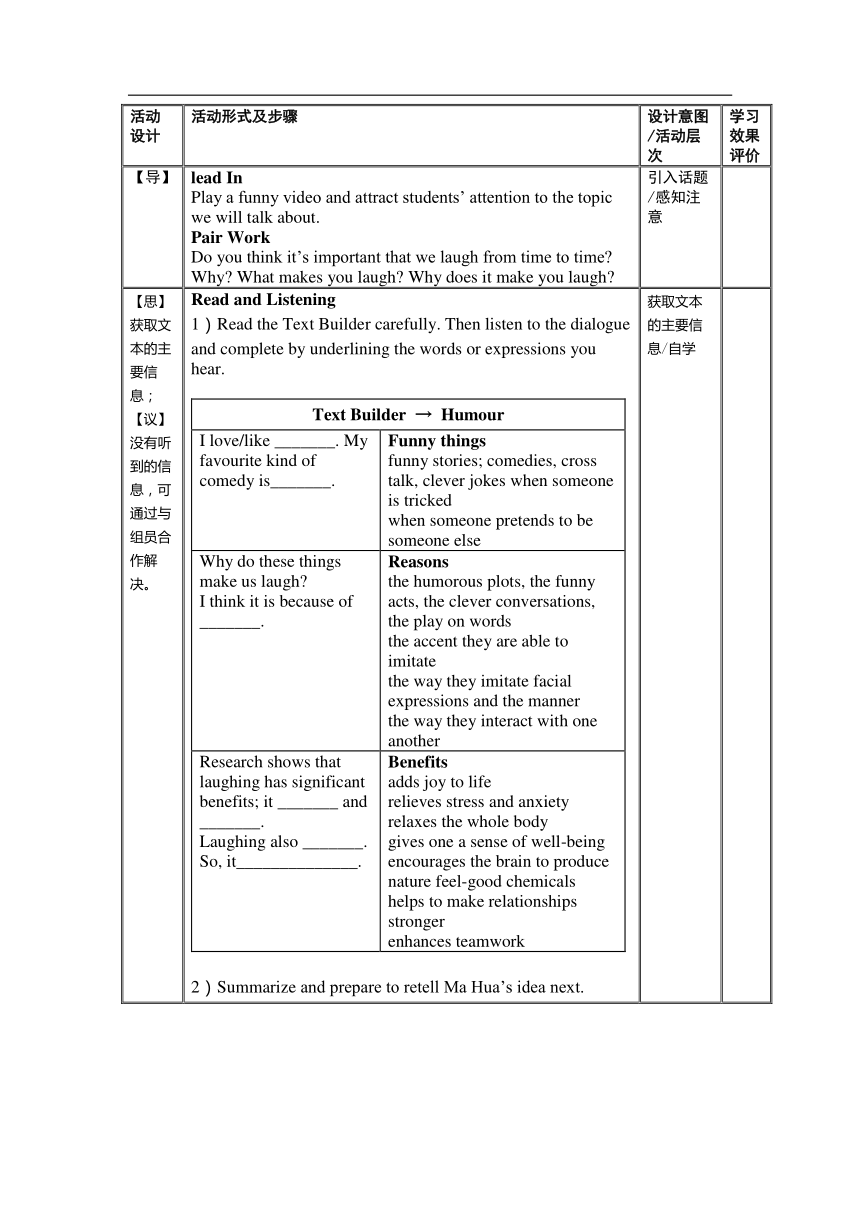北师大版(2019)选择性必修第二册Unit 4 Humour Topic Talk 教案
文档属性
| 名称 | 北师大版(2019)选择性必修第二册Unit 4 Humour Topic Talk 教案 |

|
|
| 格式 | doc | ||
| 文件大小 | 153.0KB | ||
| 资源类型 | 教案 | ||
| 版本资源 | 北师大版(2019) | ||
| 科目 | 英语 | ||
| 更新时间 | 2023-05-06 15:23:06 | ||
图片预览


文档简介
Unit 4 Humour
Topic Talk
教学背景分析
一、主题意义
本单元的主题是“幽默(感)”,属于“人与自我”主题下的“发掘生活的趣味性,养成积极的生活态度”。本课内容包括两篇听力,均以对话的形式展开。第一篇听力文本中Ma Hua向Christina回答了平日里,能为自己带来欢声笑语的方方面面,谈到了自己最喜欢的一面,并且还说出了笑能为自己(人们)带来的健康好处。第二篇听力文本围绕David向Jia Juan述说了最近遇到的趣事。本课旨在初步帮助引导学生从生活中发掘幽默的事,找到能够为自己带来欢声笑语的点。激活学生在快节奏的学习生活中寻找潜藏的快乐,缓解压力。为接下来深入学习各子话题做好准备。启发学生对自己趣味性和幽默感的培养;同时能做到自我反思,明白欢乐在生活、学习过程中的重要性,从而养成健康向上的人生态度。
二、文本分析
【what】
授课内容包括两篇听力材料。均以对话形式展开。
第一篇:文本中Ma Hua向Christina回答了平日里,能为自己带来欢声笑语的方方面面,谈到了自己最喜欢的一面,并且还说出了笑能为自己(人们)带来的健康好处。
第二篇:文本中讲的是David向Jia Juan述说最近遇到的一件趣事。提到了时间的起因,经过以及最终的充满趣味性的结果。(有记叙文的行文风格)
【why】
作者希望通过学习第一篇听力,使学生能够聚焦于自己点滴的生活,明白幽默/趣味的作用,并下意识地发掘日常生活的趣味性。
作者希望通过学习第二篇听力,学生通过David的经历,明白看似糟糕的生活琐事会因趣味性的语言而发生反转。使学生意识到充满幽默感的话术的力量。
【how】
第一篇:对话形式,Ma Hua向Christina从三个方面介绍了自己的喜好,以及在喜好中的收获。分成三部分:第一部分,表明能使自己发笑/快乐的点;第二部分阐明自己为何会为之发笑;第三部分,提到了经常“笑”的好处。
第二篇:对话形式,David向Jia Juan述说最近遇到的一件趣事。是一篇以一般过去式,按照时间的顺序展开的记叙文,讲述了David在拳击课上发生的一件尴尬的事,最终靠裁判员赵老师的诙谐语言得以化解。
三、教学目标与需求
在本课结束时,学生能够:
1. 获取梳理两段文本中主要信息;
2. 整合两段文本中的信息,并以第一人称的形式进行转述(模仿练习);
3. 学习、记忆文本中的重点搭配;
4. 写一些你认为有趣的事,并解释在生活中,我们为何需要幽默(感)。
三、教学重难点
重点
听力文本梳理
文本中出现的语言点
难点:
准确地陈述能为自己带来“笑”的方方面面。选取具体的一点,并谈一谈“笑”的好处
四、教学流程
活动设计 活动形式及步骤 设计意图/活动层次 学习效果评价
【导】 lead InPlay a funny video and attract students’ attention to the topic we will talk about.Pair WorkDo you think it’s important that we laugh from time to time Why What makes you laugh Why does it make you laugh 引入话题/感知注意
【思】获取文本的主要信息;【议】没有听到的信息,可通过与组员合作解决。 Read and Listening1)Read the Text Builder carefully. Then listen to the dialogue and complete by underlining the words or expressions you hear.Text Builder → HumourI love/like _______. My favourite kind of comedy is_______. Funny things funny stories; comedies, cross talk, clever jokes when someone is trickedwhen someone pretends to be someone elseWhy do these things make us laugh I think it is because of _______.Reasonsthe humorous plots, the funny acts, the clever conversations, the play on wordsthe accent they are able to imitatethe way they imitate facial expressions and the mannerthe way they interact with one anotherResearch shows that laughing has significant benefits; it _______ and _______.Laughing also _______. So, it______________.Benefitsadds joy to liferelieves stress and anxietyrelaxes the whole bodygives one a sense of well-beingencourages the brain to produce nature feel-good chemicalshelps to make relationships strongerenhances teamwork2)Summarize and prepare to retell Ma Hua’s idea next. 获取文本的主要信息/自学
【展】 Presentation1) Retell Ma Hua’s idea2)Use the Text builder to talk about humor and laughter.eg. funny things you would like to watch and why they make you laugh. 模仿听力文本,简单归纳转述Text Builder提及的信息;仿照Text Builder自编一个故事。/迁移与创新
【思】获取文本的主要信息;【议】没有听到的信息,可通过与组员合作解决。【展】按照议论文的散点图,根据关键句子,复述。 Read and Listening1. Listen to the plete the diagram.I had my first boxing match.I attacked back with ________.The hit landed on Mr. Zhao’s _______.As a result, he ________.I ran up to him and tried to ________.He pushed me away, ________ and ________ his feet.I was so ________ that I wanted the floor ________ and consume me.He put his free hand on my shoulder and said “________.”2. According to the diagram of the narration, retell David’s funny story.3. Theme of David’s story. 获取文本的主要信息/自学
【思】 Focus on LanguageText-11. When people imitate someone else, we laugh at the accents they are able to imitate, the way they imitate facial expressions and the manner of the people.2. You know, laughing also encourages the brain to produce natural feel-good chemicals. So it helps to make relationships stronger and enhance teamwork.Text-23. I don’t think I’ll ever lie it down.4. It was so wild that instead of the hit landing on my opponent, it landed on Mr. Zhao’s nose.5. I ran up to him and tried to help him up. I said…, gathered himself and got up to his feet. 思考着色部分的含义/理解+猜词义
【展】学生班内谈自己的理解【评】更正“展”出现的问题,统一理解。 PresentationBased on the colored expressions, ask students to show their mentsCorrect and unify the understandings. 暴露问题/总结
【检】 1. Practice1)According to the diagram of the narration, retell David’s funny story.2. Exercise1)医生发现笑得多的人更长寿。The doctor discovered that people who laugh a lot live longer.2)经常做眼保健操有助于缓解眼部疲劳。Doing regular eye exercises help to relax the eyes.3) 他说话声音很大,连隔壁房间的人都能听到。He spoke so loudly that people in the next room could hear him.4) 摔倒之后三分钟,他收拾了一下,然后面带微笑地站了起来。Falling down on the ground, he gathered himself and got up to his feet with a big smile. 检测所学/巩固迁移
【练】课时结束,学生应:1.掌握本节重点词汇的写法,用法。 2. 会转述趣味故事。 Homework: 1. copy new words for 3 times.2. Review language points and exercises.3. Use the language you have learnt to write a short paragraph about what you find funny and why we need humour. 巩固
Topic Talk
教学背景分析
一、主题意义
本单元的主题是“幽默(感)”,属于“人与自我”主题下的“发掘生活的趣味性,养成积极的生活态度”。本课内容包括两篇听力,均以对话的形式展开。第一篇听力文本中Ma Hua向Christina回答了平日里,能为自己带来欢声笑语的方方面面,谈到了自己最喜欢的一面,并且还说出了笑能为自己(人们)带来的健康好处。第二篇听力文本围绕David向Jia Juan述说了最近遇到的趣事。本课旨在初步帮助引导学生从生活中发掘幽默的事,找到能够为自己带来欢声笑语的点。激活学生在快节奏的学习生活中寻找潜藏的快乐,缓解压力。为接下来深入学习各子话题做好准备。启发学生对自己趣味性和幽默感的培养;同时能做到自我反思,明白欢乐在生活、学习过程中的重要性,从而养成健康向上的人生态度。
二、文本分析
【what】
授课内容包括两篇听力材料。均以对话形式展开。
第一篇:文本中Ma Hua向Christina回答了平日里,能为自己带来欢声笑语的方方面面,谈到了自己最喜欢的一面,并且还说出了笑能为自己(人们)带来的健康好处。
第二篇:文本中讲的是David向Jia Juan述说最近遇到的一件趣事。提到了时间的起因,经过以及最终的充满趣味性的结果。(有记叙文的行文风格)
【why】
作者希望通过学习第一篇听力,使学生能够聚焦于自己点滴的生活,明白幽默/趣味的作用,并下意识地发掘日常生活的趣味性。
作者希望通过学习第二篇听力,学生通过David的经历,明白看似糟糕的生活琐事会因趣味性的语言而发生反转。使学生意识到充满幽默感的话术的力量。
【how】
第一篇:对话形式,Ma Hua向Christina从三个方面介绍了自己的喜好,以及在喜好中的收获。分成三部分:第一部分,表明能使自己发笑/快乐的点;第二部分阐明自己为何会为之发笑;第三部分,提到了经常“笑”的好处。
第二篇:对话形式,David向Jia Juan述说最近遇到的一件趣事。是一篇以一般过去式,按照时间的顺序展开的记叙文,讲述了David在拳击课上发生的一件尴尬的事,最终靠裁判员赵老师的诙谐语言得以化解。
三、教学目标与需求
在本课结束时,学生能够:
1. 获取梳理两段文本中主要信息;
2. 整合两段文本中的信息,并以第一人称的形式进行转述(模仿练习);
3. 学习、记忆文本中的重点搭配;
4. 写一些你认为有趣的事,并解释在生活中,我们为何需要幽默(感)。
三、教学重难点
重点
听力文本梳理
文本中出现的语言点
难点:
准确地陈述能为自己带来“笑”的方方面面。选取具体的一点,并谈一谈“笑”的好处
四、教学流程
活动设计 活动形式及步骤 设计意图/活动层次 学习效果评价
【导】 lead InPlay a funny video and attract students’ attention to the topic we will talk about.Pair WorkDo you think it’s important that we laugh from time to time Why What makes you laugh Why does it make you laugh 引入话题/感知注意
【思】获取文本的主要信息;【议】没有听到的信息,可通过与组员合作解决。 Read and Listening1)Read the Text Builder carefully. Then listen to the dialogue and complete by underlining the words or expressions you hear.Text Builder → HumourI love/like _______. My favourite kind of comedy is_______. Funny things funny stories; comedies, cross talk, clever jokes when someone is trickedwhen someone pretends to be someone elseWhy do these things make us laugh I think it is because of _______.Reasonsthe humorous plots, the funny acts, the clever conversations, the play on wordsthe accent they are able to imitatethe way they imitate facial expressions and the mannerthe way they interact with one anotherResearch shows that laughing has significant benefits; it _______ and _______.Laughing also _______. So, it______________.Benefitsadds joy to liferelieves stress and anxietyrelaxes the whole bodygives one a sense of well-beingencourages the brain to produce nature feel-good chemicalshelps to make relationships strongerenhances teamwork2)Summarize and prepare to retell Ma Hua’s idea next. 获取文本的主要信息/自学
【展】 Presentation1) Retell Ma Hua’s idea2)Use the Text builder to talk about humor and laughter.eg. funny things you would like to watch and why they make you laugh. 模仿听力文本,简单归纳转述Text Builder提及的信息;仿照Text Builder自编一个故事。/迁移与创新
【思】获取文本的主要信息;【议】没有听到的信息,可通过与组员合作解决。【展】按照议论文的散点图,根据关键句子,复述。 Read and Listening1. Listen to the plete the diagram.I had my first boxing match.I attacked back with ________.The hit landed on Mr. Zhao’s _______.As a result, he ________.I ran up to him and tried to ________.He pushed me away, ________ and ________ his feet.I was so ________ that I wanted the floor ________ and consume me.He put his free hand on my shoulder and said “________.”2. According to the diagram of the narration, retell David’s funny story.3. Theme of David’s story. 获取文本的主要信息/自学
【思】 Focus on LanguageText-11. When people imitate someone else, we laugh at the accents they are able to imitate, the way they imitate facial expressions and the manner of the people.2. You know, laughing also encourages the brain to produce natural feel-good chemicals. So it helps to make relationships stronger and enhance teamwork.Text-23. I don’t think I’ll ever lie it down.4. It was so wild that instead of the hit landing on my opponent, it landed on Mr. Zhao’s nose.5. I ran up to him and tried to help him up. I said…, gathered himself and got up to his feet. 思考着色部分的含义/理解+猜词义
【展】学生班内谈自己的理解【评】更正“展”出现的问题,统一理解。 PresentationBased on the colored expressions, ask students to show their mentsCorrect and unify the understandings. 暴露问题/总结
【检】 1. Practice1)According to the diagram of the narration, retell David’s funny story.2. Exercise1)医生发现笑得多的人更长寿。The doctor discovered that people who laugh a lot live longer.2)经常做眼保健操有助于缓解眼部疲劳。Doing regular eye exercises help to relax the eyes.3) 他说话声音很大,连隔壁房间的人都能听到。He spoke so loudly that people in the next room could hear him.4) 摔倒之后三分钟,他收拾了一下,然后面带微笑地站了起来。Falling down on the ground, he gathered himself and got up to his feet with a big smile. 检测所学/巩固迁移
【练】课时结束,学生应:1.掌握本节重点词汇的写法,用法。 2. 会转述趣味故事。 Homework: 1. copy new words for 3 times.2. Review language points and exercises.3. Use the language you have learnt to write a short paragraph about what you find funny and why we need humour. 巩固
同课章节目录
- Unit 4 Humour
- Lesson 1 What’s So Funny?
- Lesson 2 Why Do We Need Humour?
- Lesson 3 My Favourite Comedian
- Unit 5 Education
- Lesson 1 Enlightening a Mind
- Lesson 2 The Objectives of Education
- Lesson 3 Understanding
- Unit 6 The Media
- Lesson 1 From Page to Screen
- Lesson 2 Questions about Media
- Lesson 3 The Advertising Game
